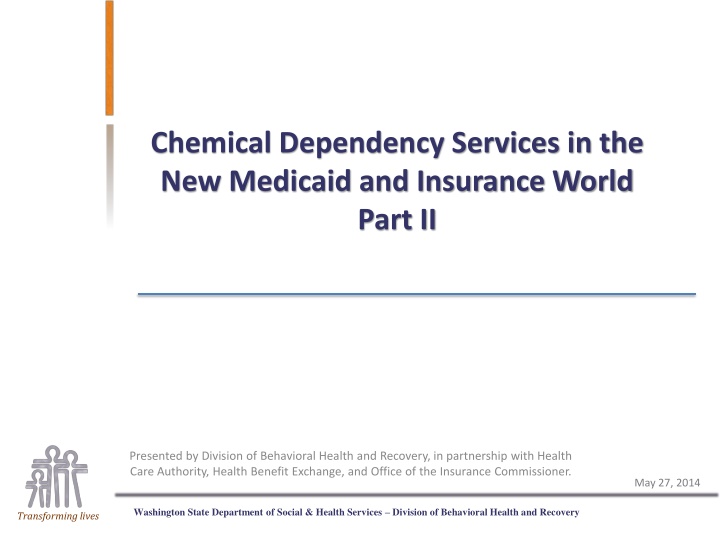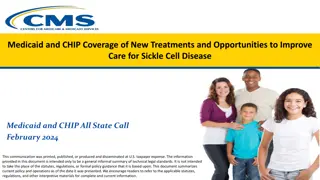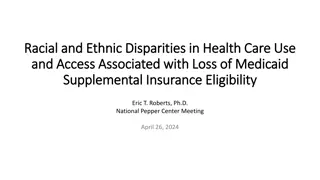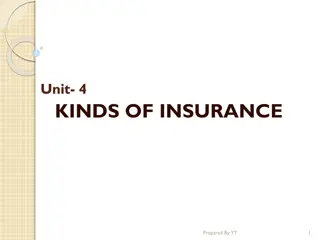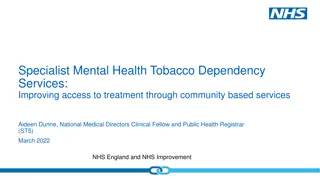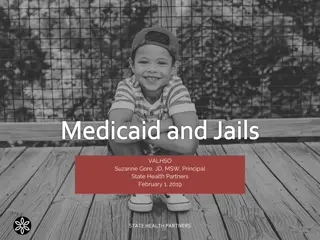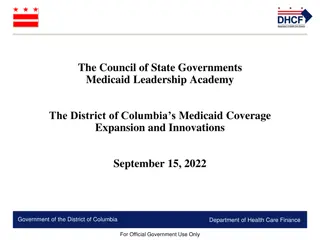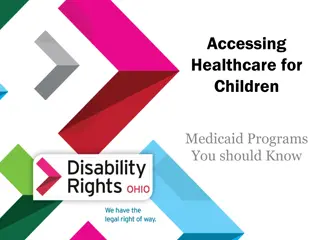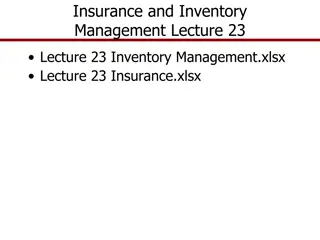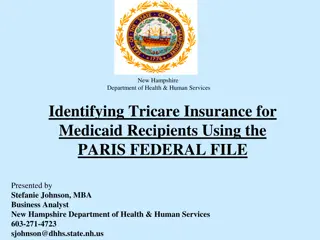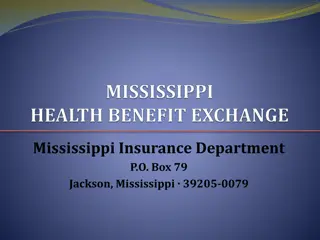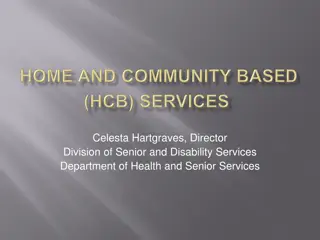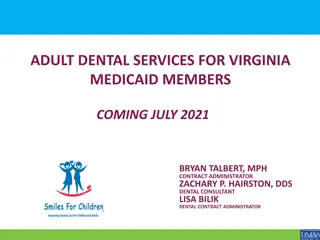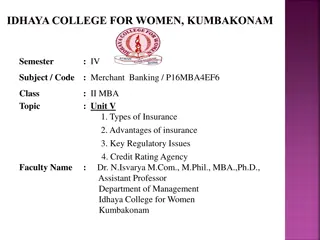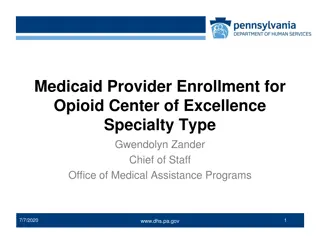Chemical Dependency Services in New Medicaid & Insurance World
Presented by Division of Behavioral Health and Recovery, in collaboration with Health Care Authority, Health Benefit Exchange, and Office of the Insurance Commissioner, this webinar series delves into the evolving landscape of chemical dependency services under the new Medicaid and insurance framework in Washington State. Key topics covered include public and private coverage options, transitioning lives through transformative services, and addressing specific queries raised in the earlier session. Explore insights on policy updates, billing procedures, and more as experts from relevant agencies share valuable information and insights.
Download Presentation

Please find below an Image/Link to download the presentation.
The content on the website is provided AS IS for your information and personal use only. It may not be sold, licensed, or shared on other websites without obtaining consent from the author.If you encounter any issues during the download, it is possible that the publisher has removed the file from their server.
You are allowed to download the files provided on this website for personal or commercial use, subject to the condition that they are used lawfully. All files are the property of their respective owners.
The content on the website is provided AS IS for your information and personal use only. It may not be sold, licensed, or shared on other websites without obtaining consent from the author.
E N D
Presentation Transcript
Chemical Dependency Services in the New Medicaid and Insurance World Part II Presented by Division of Behavioral Health and Recovery, in partnership with Health Care Authority, Health Benefit Exchange, and Office of the Insurance Commissioner. May 27, 2014 Washington State Department of Social & Health Services Division of Behavioral Health and Recovery Transforming lives
Welcome This webinar is the 2nd in a two part series. The first webinar presented a general overview of Washington State s public and private coverage options - past and present. The slide presentation can be found in the For Contractors and Providers section of the DBHR website. The recorded version will be available by June 1, 2014. This webinar is intended to provide answers to the questions presented during the first webinar. Washington State Department of Social & Health Services Division of Behavioral Health and Recovery Transforming lives
It is always a good idea to close other windows while viewing the webinar. Be sure to enter the telephone code, if you haven t already. For problems during the webinar, please contact Scott McCarty via email at scott.mccarty@dshs.wa.gov Phone Number Dial 1 (646) 307-1721 Access Code: 855-682-878 Audio Pin: (unique code on your panel) Washington State Department of Social & Health Services Division of Behavioral Health and Recovery Transforming lives
Webinar Controls Attendee List - Displays all the participants in-session Grab Tab Allows you to open/close the Control Panel, mute/unmute your audio (if the organizer has enabled this feature) and raise your hand Hand click to raise hand. Click again to lower. Audio pane Displays audio format. Click Settings to select telephone devices. Questions pane Allows attendees to submit questions and review answers (if enabled by the organizer). Broadcast messages from the organizer will also appear here. Washington State Department of Social & Health Services Division of Behavioral Health and Recovery Transforming lives
Webinar Outline Review Last Webinar General Information Grace Periods Incarceration Billing TARGET Reporting DBHR Policy Washington State Department of Social & Health Services Division of Behavioral Health and Recovery Transforming lives
Introductions Emily Brice, Office of the Insurance Commissioner Michael Arnis, Health Benefits Exchange Gail Kreiger, Health Care Authority Washington State Department of Social & Health Services Division of Behavioral Health and Recovery Transforming lives
Key Lessons from Last Webinar Two kinds of commercial insurance: Qualified Health Plans offered through Healthplanfinder (Exchange), subsidies available Off-Exchange plans in outside market QHPs and most other individual & small group plans must cover Essential Health Benefits, including mental health & substance use Limited open enrollment period, but special enrollment events Washington State Department of Social & Health Services Division of Behavioral Health and Recovery Transforming lives
Enrolling Outside Open Enrollment Question from first webinar: What about someone who loses their job (due to substance use) and then has no income going forward. Next open enrollment = November 15 February 15 Until then, special enrollment if qualifying event Examples: Life events (e.g., marriage, baby, income change) Losing other coverage (e.g., divorce, job loss) Submit documentation to Healthplanfinder or plan More info: www.wahbexchange.org/info-you/individuals-and-families/special- enrollment-faqs/ www.insurance.wa.gov/your-insurance/health-insurance/individuals- families/special-enrollment-periods/ Remember: Washington Apple Health (WAH) enrollment continuous Washington State Department of Social & Health Services Division of Behavioral Health and Recovery Transforming lives
CD Services Required in Essential Health Benefit Question from first webinar: What are the minimum required chemical dependency services required to be covered in EHB? Ex: outpatient, intensive outpatient treatment, inpatient treatment, intensive inpatient treatment, detox, etc. WAC 284-43-8678 list specifics of EHBs for CD-related services: Alcohol misuse screening and counseling (preventive service that must be provided without cost-sharing). Chemical dependency detoxification (which may not be uniformly limited to a 30-day limit, but may be subject to utilization review). Inpatient, residential, and outpatient substance use disorder services, including partial hospital programs or inpatient services, at parity as required under state and federal parity laws. Prescription medication needed for substance use disorders, including those prescribed during an inpatient or residential course of treatment. Acupuncture treatment visits, without visit limits when provided for chemical dependency. Treatment for CD services in approved treatment programs under Ch. 70.96A, per RCW 48.21.180, 48.44.240, 48.46.350 and CD definitions in RCW 48.44.245 and 48.46.355. Washington State Department of Social & Health Services Division of Behavioral Health and Recovery Transforming lives
EHB Implementation May Differ EHB sets standard, but details may differ. Eg., Formulary must be substantially equal re: category and classes covered, number of drugs per class Sources of details: Insurance policy Formulary Clinical medical necessity guidelines Utilization management guidelines Washington State Department of Social & Health Services Division of Behavioral Health and Recovery Transforming lives
Example from 2014 Qualified Health Plan Policy Covered Services Treatment and services for substance use disorders for patients with a DSM category diagnosis, including: Care at a hospital, CD rehab facility, residential treatment program, partial hospitalization, intensive outpatient, group or individual outpatient, or home health setting Prescription drugs prescribed during inpatient admission covered Acupuncture Must be medically necessary and cover least restrictive setting Inpatient admissions related to substance use disorders require preauthorization (unless involuntary commitment) Emergency admissions require notification Washington State Department of Social & Health Services Division of Behavioral Health and Recovery Transforming lives
Example from 2014 QHP Policy Not Covered Alcoholics Anonymous or other similar CD programs or support groups; Biofeedback, pain management and/or stress reduction classes; Care necessary to obtain shelter, to deter antisocial behavior, to deter runaway or truant behavior; Chemical Dependency benefits not specifically listed; Court-ordered or other assessments to determine the medical necessity of court-ordered treatments; Court-ordered treatments or treatments related to deferral of prosecution, deferral of sentencing or suspended sentencing or treatments ordered as a condition of retaining driving rights, when no medical necessity exists; or Custodial Care, including housing that is not integral to a Medically Necessary level of care, such as care necessary to obtain shelter, to deter antisocial behavior, to deter runaway or truant behavior or to achieve family respite Washington State Department of Social & Health Services Division of Behavioral Health and Recovery Transforming lives
Prior Authorization and QHPs Question from first webinar: Providers are getting pre- auths but still not getting paid, why? Plan can use medical management techniques But parameters in WAC 284-43-410: Must make standards available to providers Cannot retrospectively deny coverage/payment on standards not communicated to provider Timeliness standards: 1 business day for emergency 24 hours for concurrent if also urgent 48 hours for urgent care 5 calendar days for non-urgent pre-service 30 calendar days for post-service reviews Washington State Department of Social & Health Services Division of Behavioral Health and Recovery Transforming lives
General Information Question from first webinar: When can a person apply for Apple Health? Based on Life Events Loss of employment Loss of health insurance Change of income Question from first webinar: Are habilitative services covered for individuals on classic Apple Health? Pt, OT, ST and DME services may fall under the new habilitative benefit Question from first webinar: Is Apple Health managed care in each county? Yes some form of managed care is available in each county. Some counties have mandatory managed care coverage. Washington State Department of Social & Health Services Division of Behavioral Health and Recovery Transforming lives
General Information, continued Question from first webinar: Can a patient have their own employee insurance plan and be on Apple Health? An individual can have coverage thru their employer and can also qualify for Apple Health Question from first webinar: Can someone be eligible for low income in December 2013 and become ineligible in January 2014? Income could change Question from first webinar: Is there a central portal for providers to check eligibility? ProviderOne Third party Insurance Washington State Department of Social & Health Services Division of Behavioral Health and Recovery Transforming lives
Any Questions? Washington State Department of Social & Health Services Division of Behavioral Health and Recovery Transforming lives
QHPs and Grace Period Question from first webinar: Is there a grace period? Will the provider be responsible for cost if enrollee does not meet their grace period? Non-subsidized enrollee 1-month grace period Subsidized enrollee 3-month grace period: QHP will be expected to pay claims during the first month, but may suspend claims in the second and third months QHP cannot deny claims during the second and third months Settling outstanding premiums, then claims paid QHP carriers must notify providers Washington State Department of Social & Health Services Division of Behavioral Health and Recovery Transforming lives
QHPs and Grace Period Subsidized enrollee 3-month grace period: flow Washington State Department of Social & Health Services Division of Behavioral Health and Recovery Transforming lives
Any Questions? Washington State Department of Social & Health Services Division of Behavioral Health and Recovery Transforming lives
Incarceration and the Exchange Questions from first webinar: What is the definition of incarceration ? Does an individual who is incarcerated for 3 days jail time need to disenroll? Can an incarcerated individual apply for benefits? Incarcerated means serving a term in prison or jail. Incarceration is not being in jail or prison pending disposition of charges (not convicted of a crime). Incarceration is not being on probation, parole, home confinement, or a residential facility under supervision. Incarcerated people don t have to pay the fee for being uninsured Incarcerated pending disposition of charges can use the Marketplace Washington State Department of Social & Health Services Division of Behavioral Health and Recovery Transforming lives
Incarceration and Medicaid Medicaid won t pay for medical care while a person is in prison or jail. Can enroll in Medicaid while incarcerated. Apply online at either HealthCare.gov or www.wahealthplanfinder.org For a complete list of options go to: www.dshs.wa.gov/pdf/manual/Program%20Option s%20For%20Inmates%20Matrix.pdf Washington State Department of Social & Health Services Division of Behavioral Health and Recovery Transforming lives
Any Questions? Washington State Department of Social & Health Services Division of Behavioral Health and Recovery Transforming lives
Billing Questions from first webinar: How does a provider get paid from ProviderOne after insurance has paid? Submit the claim with the Explanation of Benefits (EOB) from the insurance company. Questions from first webinar: How will a provider know if deductible has been met? Ask the insurance company. Medicaid will include the deductible in their payment Questions from first webinar: Should a provider be collecting the deductible? If the client is covered by Medicaid you can t collect a deductible from the client. Washington State Department of Social & Health Services Division of Behavioral Health and Recovery Transforming lives
TARGET Reporting Question from first Webinar: What are Health Exchanges considered for TARGET purposes? Health Exchange plans are considered private pay in TARGET Question from first Webinar: Is TARGET tracking Presumptive SSI clients? In discussion on how to best track Question from first Webinar: If a parent is an N05, are their dependents also N05s? No, the children are enrolled in an existing children s program. Washington State Department of Social & Health Services Division of Behavioral Health and Recovery Transforming lives
Any Questions? Washington State Department of Social & Health Services Division of Behavioral Health and Recovery Transforming lives
DBHR Policy Question from first Webinar: When will rates go up? In the preliminary discussion phase Question from first Webinar:Is there a wait list requirement for Washington Apple Health clients? Must schedule an appointment for assessment. Question from first Webinar: Are UAs covered chemical dependency treatment? Opiate Substitution Pregnant Women Question from first Webinar: Is there discussion about funding Recovery Coaches? In the preliminary discussion phase Washington State Department of Social & Health Services Division of Behavioral Health and Recovery Transforming lives
DBHR Policy Question from first Webinar: Is abuse diagnosis a billable service? Pregnant Women Youth Question from first Webinar: Will treatment services provided to individuals presenting with the new DSM-5 substance abuse diagnosis of mild be reimbursable? Yes, for Pregnant women and youth No other determination yet for adults Question from first Webinar: Can other DBHR funds be used to provide treatment to those who can t afford deductibles or copays? DBHR will not be paying for insurance from other funds. Washington State Department of Social & Health Services Division of Behavioral Health and Recovery Transforming lives
DBHR Policy Question from first Webinar: Is it a requirement that treatment services be provided to those who refuse to sign up for Apple Health or Exchanges? There is no requirement Question from first Webinar: Will DBHR fiscal be sending a report to counties indicating how much state funds should be considered match for Title XIX set- aside? Working on spreadsheet on how to plan for match on Presumptive SSI. Washington State Department of Social & Health Services Division of Behavioral Health and Recovery Transforming lives
Contact Information Question from first Webinar: Who to contact with questions about QHPs or other insurance? Apple Health (Medicaid): Customer Service Center (1-800-562-3022), Long waits are sometimes required, but self- service options are available https://fortress.wa.gov/hca/p1contactus/ Healthplanfinder: Enrollment or subsidies 1-855-WAFINDER (1-855-923-4633), M-F 7:30 a.m. to 8 p.m. customersupport@wahbexchange.org OIC: Insurance coverage, costs, and practices 1-800-562-6900, M-F 8 a.m. to 5 p.m. File complaint online: www.insurance.wa.gov/complaints%2Dand%2Dfraud/file%2Da% 2Dcomplaint/insurance%2Dcompany/ Washington State Department of Social & Health Services Division of Behavioral Health and Recovery Transforming lives
Any Questions? Washington State Department of Social & Health Services Division of Behavioral Health and Recovery Transforming lives
Thank You for participating If you have any other questions that were not answered here please contact Sandra Mena-Tyree at menasa@dshs.wa.gov Washington State Department of Social & Health Services Division of Behavioral Health and Recovery Transforming lives
